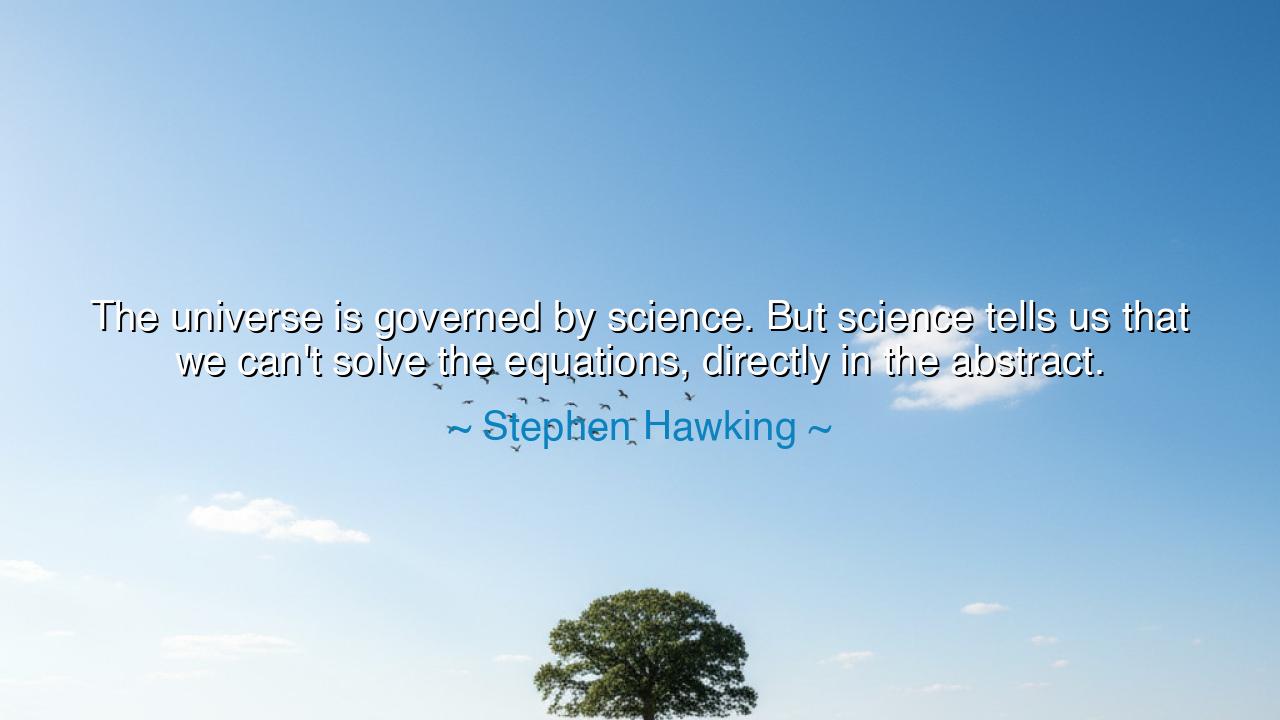
The universe is governed by science. But science tells us that we
The universe is governed by science. But science tells us that we can't solve the equations, directly in the abstract.






Hear now, O children of the earth, the words of Stephen Hawking, whose deep insight into the very fabric of the cosmos reminds us of a profound truth. "The universe is governed by science. But science tells us that we can't solve the equations, directly in the abstract." In these words, Hawking speaks to the very heart of understanding, revealing that the world we inhabit, the universe itself, is not a chaotic accident but a place of order and law, ruled by the unseen forces of science. And yet, despite this order, there are limits to our ability to comprehend it. The equations that describe the universe—the forces that bind the stars, the laws that govern life itself—are beyond our reach when approached in the abstract, detached from the reality we experience. Even in the face of great knowledge, there remains a mystery that science, in its purest form, cannot solve alone.
In the ancient world, O children, the pursuit of truth was no less a challenge than it is today. The early philosophers, such as Plato and Aristotle, sought to understand the nature of existence, to uncover the laws that governed the heavens and the earth. Plato believed that the world of ideas was the true realm of truth, while Aristotle sought to understand the tangible world through logic and observation. They both understood that order and balance existed in the cosmos, but their quest for knowledge was limited by the tools of their time. The abstract truths they sought—truths about the universe and the soul—remained elusive, for they could not fully reconcile the grand ideas they dreamed of with the concrete world in which they lived. And so, their knowledge was forever bound by the limits of their understanding.
Consider, O children, the story of Isaac Newton, whose revolutionary work laid the foundations of classical physics. Newton’s laws of motion and the theory of universal gravitation were groundbreaking, showing the order that exists in the universe, from the falling apple to the movement of the planets. Yet, even Newton, with all his genius, faced limits. He could not explain everything, could not solve the deepest equations of nature. His work revealed the laws of the visible world, but left the mysteries of the universe—the very nature of light, the fabric of space, and the force of gravity—still unsolved. Even as he unlocked great truths, Newton’s work demonstrated that science, in its search for abstract truths, could only go so far without grounding those truths in observable reality.
The arrival of Albert Einstein, with his theory of relativity, pushed the boundaries of science further, demonstrating that the space-time continuum itself was not a fixed, eternal structure but a dynamic and flexible reality, shaped by mass and energy. Einstein’s work revealed that gravity was not a force acting at a distance, as Newton had described, but a distortion in the very fabric of space and time. Yet, even Einstein’s brilliance could not solve the deepest mysteries of the universe. Quantum mechanics, a theory that governs the behavior of particles at the smallest scales, remained an enigma. And so, science continued to evolve, with each new theory opening more questions than it answered, revealing that the pursuit of knowledge is not a straight path, but a journey that winds through complexity and uncertainty.
Hawking's words remind us that even in our most advanced understanding of the universe, there are limits to how we can approach it. We may know the equations that describe the laws of nature, but those equations do not always lead us directly to understanding when we approach them in the abstract. The universe, with all its vastness and intricacy, does not always reveal its secrets to pure reasoning alone. Just as Newton and Einstein faced limitations in their theories, so too must we accept that science is a journey without finality. Each equation we solve opens the door to deeper mysteries, showing that even in our greatest triumphs, there remains a mystery that is both awe-inspiring and humbling.
The lesson, O children, is one of humility and curiosity. The universe is a vast and complex tapestry, woven together by forces that we are only beginning to understand. The pursuit of truth in science is not about reaching a single, final answer, but about continually seeking, continually questioning, and continually understanding. Hawking teaches us that science is not about mastering all the abstract equations but about learning to see the world as it is, both in its order and in its mystery. To reason over the universe is to recognize its beauty and its complexity, and to embrace the fact that we will never fully know everything. But this, O children, is the true power of science—the ability to ask the right questions, to seek understanding, and to accept that the journey of discovery is as important as the answers we seek.
So, O children, let this truth guide you in your pursuit of knowledge. Do not be discouraged when the answers are not clear, when the equations do not lead you directly to the truth. Know that the path of science is not a straight line but a winding road, filled with unexpected revelations and unanswered questions. Embrace the uncertainty, for it is through this uncertainty that you will find the greatest wonders. Science, like the universe itself, is a process—a process of exploration, of discovery, and of humility. Walk this path with courage, for in seeking the truth, you are part of the grand journey of human understanding.






AAdministratorAdministrator
Welcome, honored guests. Please leave a comment, we will respond soon